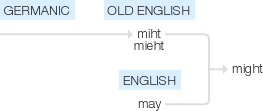Might
Old English miht, mieht, of Germanic origin; related to may1.
wiktionary
From Middle English myght, might (also maught, macht, maht), from Old English miht, mieht, meaht, mæht(“might, bodily strength, power, authority, ability, virtue, mighty work, miracle, angel”), from Proto-West Germanic *mahti, from Proto-Germanic *mahtiz, *mahtuz(“might, power”), from Proto-Indo-European *mógʰtis, *megʰ-(“to allow, be able, help”), corresponding to Germanic *maganą + *-þiz.
Cognate with Scots micht, maucht(“might”), North Frisian macht(“might, ability”), West Frisian macht(“might, ability”), Dutch macht(“might, power”), German Macht(“power, might”), Swedish makt(“might”), Norwegian makt(“power”), Icelandic máttur(“might”), Gothic 𐌼𐌰𐌷𐍄𐍃( mahts). Related to may.
From Old English meahte and mihte, from magan, whence English may.
etymonline
might (v.)
Old English mihte, meahte, originally the past tense of may (Old English magen "to be able"), thus "*may-ed." The noun might-have-been "something that might have happened but did not," also "someone that might have been greater but wasn't," is by 1848.
might (n.)
"quality of being able, ability to do or act, power," Middle English might, from Old English miht, earlier mæht "bodily strength, power; authority, dominion, control; ability," from Proto-Germanic *makhti- (source also of Old Norse mattr, Old Frisian, Middle Dutch, Dutch macht, Old High German maht, German Macht, Gothic mahts), a Germanic suffixed form of the PIE root *magh- "to be able, have power."
